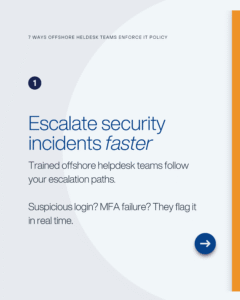Case Study
7 Ways Offshore Helpdesk Teams Enforce IT Policy Without Compromising Control
IT policies are only as strong as the teams enforcing them. For companies operating across time zones or relying on offshore support, that enforcement becomes both a technical and operational challenge.
Done right, offshore helpdesk teams can become an extension of your compliance framework, not a liability. Here are seven practical ways global teams uphold security and policy in today’s hybrid IT environments.
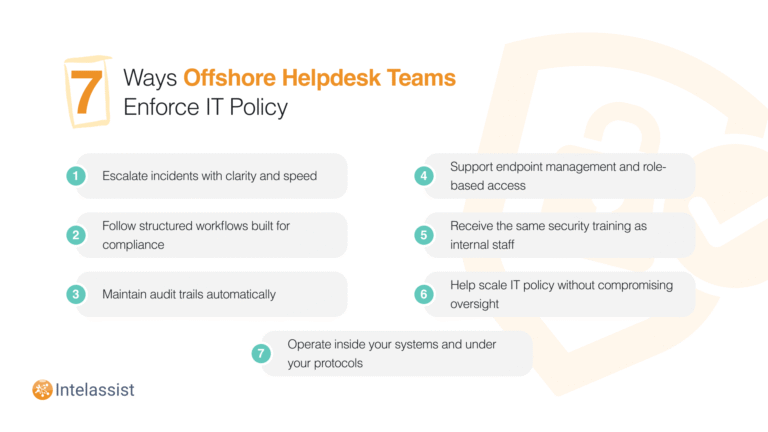
1. They escalate incidents with clarity and speed
When offshore tea
ms are trained in your escalation matrix, they know exactly how to respond to issues like suspected phishing attempts, password compromise, or unauthorized access. This reduces delays and avoids missteps in early response windows.

2. They follow structured workflows built for compliance
Effective helpdesk operations rely on standardized ticketing categories: access requests, resets, incident reports, software changes. Offshore staff trained in these flows can enforce them consistently: logging every action, linking approvals, and closing the loop on required steps.

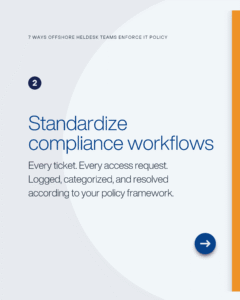
3. They maintain audit trails automatically.
Using ticketing systems like Jira, ServiceNow, or Zendesk, offshore teams help capture who did what, when, and why. Each interaction is documented from system access changes to software provisioning, and stored for compliance review.

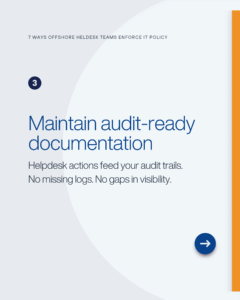
4. They support endpoint management and role-based access.
A good offshore helpdesk model enforces least-privilege access. This includes supporting the setup and revocation of user accounts, enforcing VPN and MFA policies, and monitoring device compliance.

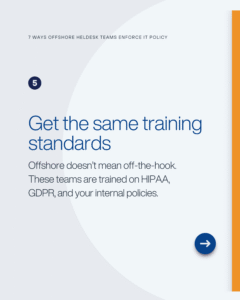
5. They receive the same security training as internal staff.
Security is about behavior. Offshore professionals should complete training on phishing, data handling, incident response, and compliance protocols like HIPAA, GDPR, and SOC 2. When they understand the “why,” enforcement becomes second nature.

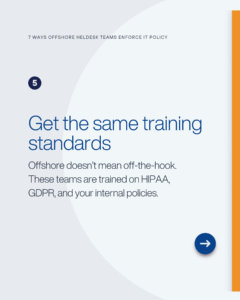
6. They help scale IT policy without compromising oversight.
Offshore support enables organizations to handle more tickets without hiring locally, especially during high-volume periods like software rollouts or compliance deadlines. But scalability doesn’t have to mean letting go of control.

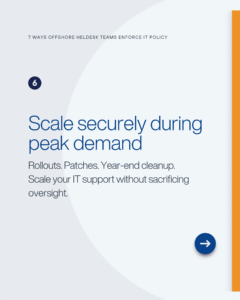
7. They operate inside your systems and under your protocols.
The most effective offshore helpdesk teams aren’t just adjacent vendors. They are embedded in your ecosystem: following your SLAs, working inside your ticketing environment, and escalating within your org chart.

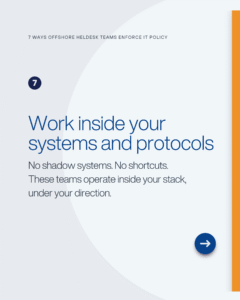
Final Thought
Offshore helpdesk support is about both efficiency and consistency. The right structure enables teams to enforce IT policies across borders, time zones, and service tiers without losing visibility or risking compliance gaps.

About Intelassist
Intelassist provides full-time offshore IT support professionals trained in policy enforcement, endpoint security, ticket triage, and audit-ready documentation. Our teams work inside your systems and align with your protocols, operating under your direction and maintaining high standards of visibility, escalation, and compliance.
With experience across accounting and finance, healthcare, customer support, and architecture and engineering, Intelassist helps scale IT helpdesk functions while safeguarding performance and trust. Email us at info@intelassist.com.
For those interested in exploring Intelassist’s job opportunities, please visit our careers page.
contact US
How can we help?
Get in touch with one of our local experts today. We typically respond within 24 hours.

